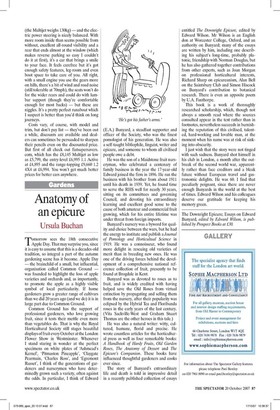Anatomy of an epicure
Ursula Buchan T°morrow sees the 18th consecutive Apple Day. That may surprise you, since it is easy to assume that this is a decades-old tradition, so integral a part of the autumn gardening scene has it become. Apple Day — the brainchild of a small, but influential, organisation called Common Ground — was founded to highlight the loss of apple varieties and orchards and, as importantly, to promote the apple as a highly visible symbol of local particularity. If home gardeners grow a greater range of cultivars than we did 20 years ago (and we do) it is in large part due to Common Ground.
Common Ground has the support of professional gardeners, who love growing fruit, since it tests their mettle even more than vegetables do. That is why the Royal Horticultural Society still stages beautiful displays of fruit every October at the London Flower Show in Westminster. Whenever I stand staring in wonder at the perfect specimens on white plates of Ashmead's Kernel', Pitmaston Pineapple', 'Claygate Pearmain, 'Charles Ross', and `Egremont Russet', I think of the generations of gardeners and nurserymen who have determinedly grown such a variety, often against the odds. In particular, I think of Edward (E.A.) Bunyard, a steadfast supporter and officer of the Society, who was the finest pomologist of his generation. He was also a self-taught bibliophile, linguist, writer and epicure, and someone to whom all civilised people owe a debt.
He was the son of a Maidstone fruit nurseryman, who celebrated a centenary of family business in the year the 17-year-old Edward joined the firm in 1896. He ran the business with his brother from about 1911 until his death in 1939. Yet, he found time to serve the RHS well for nearly 30 years, sitting on its committees and governing Council, and devoting his extraordinary learning and excellent good sense to the cause of both amateur and commercial fruit growing, which for his entire lifetime was under threat from foreign imports.
Bunyard's nursery was a byword for quality and choice between the wars, but he had the energy to institute and publish a Journal of Pomology and Horticultual Science in 1919. He was a connoisseur, who found more delight in rescuing old varieties of merit than in breeding new ones. He was one of the driving forces behind the development of a comprehensive national reference collection of fruit, presently to be found at Brogdale in Kent.
Bunyard was as devoted to roses as to fruit, and is widely credited with having helped save the Old Roses from virtual extinction by propagating and selling them from the nursery, after their popularity was eclipsed by the Hybrid Tea and Floribunda roses in the early years of the last century. (Vita Sackville-West and Graham Stuart Thomas are the other heroes in this tale.) He was also a natural writer: witty, cultured, humane, florid and precise. He wrote countless articles for the horticultural press as well as four remarkable books: A Handbook of Hardy Fruits, Old Garden Roses, The Anatomy of Dessert and The Epicure's Companion. These books have influenced thoughtful gardeners and cooks ever since.
The story of Bunyard's extraordinary life and death is told in impressive detail in a recently published collection of essays entitled The Downright Epicure, edited by Edward Wilson. Mr Wilson is an English don at Worcester College, Oxford, and an authority on Bunyard; many of the essays are written by him, including one describing his subject's long-time, probably platonic, friendship with Norman Douglas, but he has also gathered together contributions from other experts, such as Joan Morgan on professional horticultural interests, Richard Sharp on epicureanism, Alan Bell on the Saintsbury Club and Simon Hiscock on Bunyard's contribution to botanical research. There is even an apposite poem by U.A. Fanthorpe.
This book is a work of thoroughly researched scholarship, which, though not always a smooth read where the sources consulted appear in the text rather than in footnotes, nevertheless succeeds in burnishing the reputation of this civilised, talented, hard-working and lovable man, at the moment when his name was at risk of sinking into obscurity.
I just wish that the story were not tinged with such sadness. Bunyard shot himself in his club in London, a month after the outbreak of the second world war, apparently rather than face creditors and a bleak future without European travel and gastronomic delights. He was 60. I find that peculiarly poignant, since there are never enough Bunyards in the world at the best of times. Edward Wilson and his colleagues deserve our gratitude for keeping his memory green.
The Downright Epicure; Essays on Edward Bunyard, edited by Edward Wilson, is published by Prospect Books at £30.







































































 Previous page
Previous page